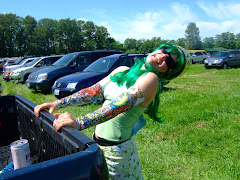 Why read stories about tragedies--deaths, disappearances, and the assorted harms that humans can inflict on one another--when there's already so much ugliness in the world? Why replicate the pain of loss in made-up stories, package and promote it? Doesn't this just contribute to the already staggering amount of sadness that exists in reality?
Why read stories about tragedies--deaths, disappearances, and the assorted harms that humans can inflict on one another--when there's already so much ugliness in the world? Why replicate the pain of loss in made-up stories, package and promote it? Doesn't this just contribute to the already staggering amount of sadness that exists in reality?I like to believe that fictional stories about crime and loss offer us some salvation from the true miseries that dominate headlines. For one, novels and stories, even (and especially, perhaps) those that tackle the most difficult topics, transform tragedy into art, somehow endowing the unexplainable with redeeming qualities. News stories rarely delve into the true depth of the players involved, focusing instead on the sorrow of survivors, the detestability of the perpetrators, and whatever au-courant commentary a given crime purportedly offers on modern society.
Talented, sensitive storytellers create worlds inhabited by three-dimensional characters who, unlike their real-life CNN doppelgangers, can offer explanations. We learn their backgrounds, their complications, their motivations, and we can understand why they acted as they did. Empathizing with villains isn't necessarily the outcome: gaining a deeper understanding of human psychology is.
Laura Lippman is a multi-award-winning mystery author whose novels features dynamic, complex characters whose actions are carefully dissected and whose backstories are fully explored, creating multi-dimensional novels that address the how and why of human behavior. In her new novel, Life Sentences, protagonist Cassandra Fallows aims to follow the success of her two memoirs with a true-crime book that examines the mysterious case of her childhood acquaintance, Calliope Jenkins, who spent 7 years in jail after refusing to reveal the whereabouts of her missing infant son.
In investigating Calliope's story, Cassandra is forced to confront her own past: her broken friendships with three women she wrote about in her memoirs; her philandering father, her wounded mother, and her own failed relationships and mistakes. As she unravels the mystery of Calliope's missing child and the reason for her silence, she learns as much about herself as she does the other woman. And possibly, we'll do the same as we read: understand more about ourselves and the people we are surrounded by.
